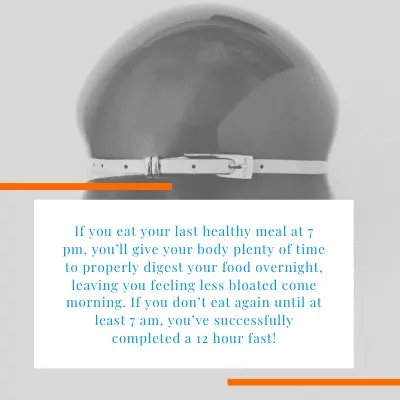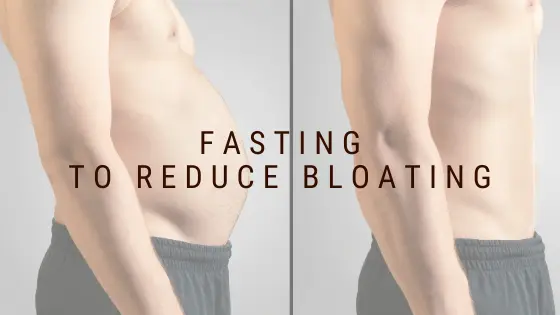Intermittent fasting has a wide variety of health benefits and fasting to reduce bloating is high on many people’s priority lists. Unfortunately, if you’ve got a sensitive stomach and you aren’t careful about how you eat surrounding your fast, you could end up making your bloating worse.
In this article, we’ll look at various reasons or causes of bloating and gas, and various ways you can move well beyond it. Fasting is one effective way to reduce bloating, but it should complement a few other lifestyle and nutritional changes for best results.
Causes of Abdominal Bloating and Gas
What causes bloating? Bloating is most commonly caused by gas or air intake, especially while eating. When undigested food gets broken down, gas can build up in the digestive tract. Air intake is more common when people eat or drink because it’s easier for big gulps of air to be swallowed. When you swallow air, it can only escape in two ways: burping or farting. Until it’s passed, it remains in your gut.
Sometimes bloating is caused by an actual medical condition or an irritation to certain foods or drinks. Many people have negative reactions to dairy (lactose intolerance) which happens when the small intestine doesn’t make enough lactase enzymes for the body to break down the lactose.
Alternatively, bloating can be caused by Premenstrual Syndrome (PMS). PMS can have many symptoms that go along with it, bloating being an extremely common symptom which can cause some discomfort. PMS flairs up when there’s a change in serotonin levels and sex hormones, which happens when a woman is going to begin menstruating soon. It will usually calm down once her period begins.
There are a wide variety of things that can and will cause bloating and/or gas, many of which can be solved on your own with simple lifestyle tweaks. Some may be cause for concern and if you’re ever worried about your health, you should contact your doctor.
How to Get Rid of Bloating
A very common cause of bloating is what you’re putting into your stomach. Both allergies and intolerances could be a factor, but it’s more likely the poor quality of your food. Eating processed, high-sugar foods could be the source of your discomfort, not to mention alcohol.
It’s harder for our small intestines to break down such heavy foods, which leaves pieces of your meal floating around in your digestive tract. One solution is to cut down on how much unhealthy food you eat, and how much alcohol you drink. Unfortunately, there’s some bad news: some very healthy vegetables can cause bloating as well. That delicious cauliflower, asparagus, broccoli or cabbage that you had for dinner, could be making you feel yucky and bloated as well.
Fasting To Reduce Bloating Overnight
The first thing you want to remember when you’re trying to fight bloating is to wait until it has completely gone down before eating again. Also, to help your body digest food better, make sure you’re chewing every bite very well. Try 20 times per fork/spoon full.
If that still isn’t working for you, intermittent fasting is another option. There are many different ways to try fasting and, if you want to see which type is right for you, you can read our post, Types of Fasting. Having fewer meals in a day is one way to reduce bloating, but while you fast you’ll also want to be careful about what you consume during your eating hours, as well as how much you’re eating. Many people try to eat much larger meals since they’re worried about not eating as much in a day, however, doing so can cause the exact bloating you’re trying to avoid. It’s better to eat only until you’re full.
If you eat your last healthy meal at 7 pm, you’ll give your body plenty of time to properly digest your food overnight, leaving you feeling less bloated come morning. If you don’t eat again until at least 7 am, you’ve successfully completed a 12 hour fast!

Avoid Making Your Bloating Worse
Nobody enjoys being bloated. Luckily there are ways to avoid making it worse.
If you’ve decided to try intermittent fasting, there may be small things you could be doing wrong that actually cause more bloating. Watch what you eat when you do have a meal, avoiding foods that are low in fiber.
Along with the foods you eat, you will have to watch your water intake and be sure to drink plenty throughout the day. If you aren’t careful with what and how much you’re eating, you could slow down your digestion and make your bloating worse, even developing constipation.
Foods to Reduce Bloating Quickly
Many foods you think of as healthy could be the ones that do the most damage such as garlic, apples, and especially wheat.
Garlic is found in many foods and is even used as a remedy to certain illnesses but it also causes bloating. If you use garlic in a lot of your dishes try replacing it with another herb or spice such as basil, parsley, or thyme.
Many people claim they get more energy from eating an apple in the morning than they do from having a cup of coffee. Although in some ways apples are healthier than coffee, they can cause bloating, thanks to the fructose in the apple. Some people can digest apples better if they’re cooked, so you could give that a try. If you want to avoid the risk all together try some bananas, grapefruits, strawberries, or other fruit with minimal fructose. They may not give you the same burst of energy but it will help with the bloating!
Wheat is a very common ingredient and can be harder to avoid. Gluten, specifically, is the cause of the severe bloating or upset stomach. Many people have an intolerance or sensitivity to gluten, or even an allergy if they suffer from celiac disease. Avoiding wheat/gluten can be difficult because it’s found in so many things: pastries, pasta, bread, and anything with a crust. If you reduce the amount of packaged foods you eat and start baking more for yourself, there are many healthy substitutes you can swap for wheat flour: quinoa, coconut, almond, and many more.
Changing up your diet can be difficult and even scary, but with a little research and some planning, you could be living a healthier, more comfortable life in no time.
Feel Lighter, Look Slimmer
Being bloated isn’t the same thing as carrying around excess weight, but it does make you feel heavier and more uncomfortable. If you practice intermittent fasting strategically, you can drastically reduce your experience of bloating daily, helping you feel thinner and healthier every day.
If weight loss is your goal, fasting can help you in many ways. You should check out our post, Fasting to Lose Weight, to see if it’s a smart choice for you and your lifestyle.




